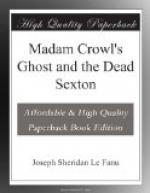As Tom Scales led the horse away to the stables it turned its head towards its master with a short, shill neigh.
“About your business, old gentleman—we must not go too fast,” the stranger cried back again to his horse, with a laugh as harsh and piercing; and he strode into the house.
The hostler led this horse into the inn yard. In passing, it sidled up to the coach-house gate, within which lay the dead sexton—snorted, pawed and lowered its head suddenly, with ear close to the plank, as if listening for a sound from within; then uttered again the same short, piercing neigh.
The hostler was chilled at this mysterious coquetry with the dead. He liked the brute less and less every minute.
In the meantime, its master had proceeded.
“I’ll go to the inn kitchen,” he said, in his startling bass, to the drawer who met him in the passage.
And on he went, as if he had known the place all his days: not seeming to hurry himself—stepping leisurely, the servant thought—but gliding on at such a rate, nevertheless, that he had passed his guide and was in the kitchen of the George before the drawer had got much more than half-way to it.
A roaring fire of dry wood, peat and coal lighted up this snug but spacious apartment—flashing on pots and pans, and dressers high-piled with pewter plates and dishes; and making the uncertain shadows of the long “hanks” of onions and many a flitch and ham, depending from the ceiling, dance on its glowing surface.
The doctor and the attorney, even Sir Geoffrey Mardykes, did not disdain on this occasion to take chairs and smoke their pipes by the kitchen fire, where they were in the thick of the gossip and discussion excited by the terrible event.
The tall stranger entered uninvited.
He looked like a gaunt, athletic Spaniard of forty, burned half black in the sun, with a bony, flattened nose. A pair of fierce black eyes were just visible under the edge of his hat; and his mouth seemed divided, beneath the moustache, by the deep scar of a hare-lip.
Sir Geoffrey Mardykes and the host of the George, aided by the doctor and the attorney, were discussing and arranging, for the third or fourth time, their theories about the death and the probable plans of Toby Crooke, when the stranger entered.
The new-comer lifted his hat, with a sort of smile, for a moment from his black head.
“What do you call this place, gentlemen?” asked the stranger.
“The town of Golden Friars, sir,” answered the doctor politely.
“The George and Dragon, sir: Anthony Turnbull, at your service,” answered mine host, with a solemn bow, at the same moment—so that the two voices went together, as if the doctor and the innkeeper were singing a catch.




